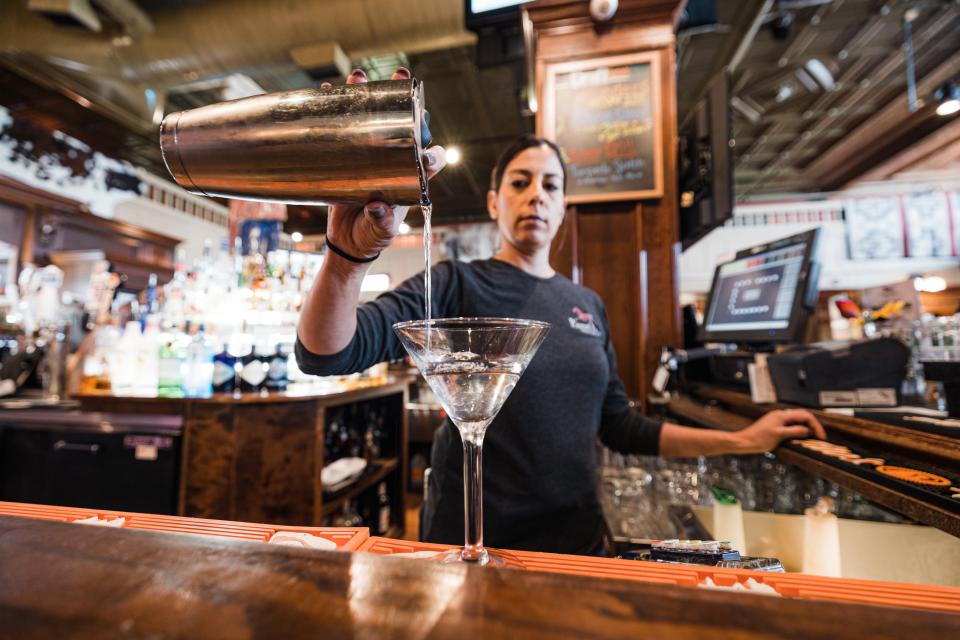Decades-old liquor law could change if voters want it to, county commissioner says
Anyone who celebrated the end of 2023 in Washington County might have done so with an empty glass due to a four-decades-old liquor law.
Usually, bars serve alcohol from 10 a.m. to 2 a.m., except on Sundays, when it's noon to midnight. That is problematic when New Year's Eve falls on a Sunday, which has happened six times since the law went into effect.
That could change if the voters of Washington County decide a more modern approach is needed, said County Commissioner Mitch Antle.
Antle wants feedback from the community and businesses about updating serving hours. Over the next 21 years, three more New Year's Eves will fall on a Sunday, the next in 2034.

The battle over "wet" and "dry"
But to understand how we got here, we have to take a walk down memory lane.
The year was 1985, and Oklahoma was at a crossroads over how citizens could consume the controversial "Nectar of the Gods," "Liquid Courage," or simply booze.
Oklahoma became the last state to repeal prohibition in 1959, much to the displeasure of the Women's Christian Temperance Union. With it came a compromise that would be affectionately known as "liquor-by-the-wink" laws.
Before 1985, any Oklahoman wishing to imbibe a stiffer drink than beer would either have to drink at home or join a bottle club. A bottle club is just a bar with more steps to take to get a drink.
Patrons of a bottle club would pay a fee and bring a bottle of their finest to be kept at the club. Members would be served only from their bottles and no one else could drink from it —"wink, wink."
In practice, Washington County District Attorney Craig D. Corgan told Bartlesville residents during a 1985 Chamber of Commerce meeting that those laws were widely unenforced, according to an Examiner-Enterprise news story at the time.
These unenforced laws resulted in an estimated 1 million illegal drinks being sold every year.
After failed attempts to allow liquor-by-the-drink in 1972 and 1976, Oklahoma legislators finally gave individual counties the power to vote on whether to be a "wet" or "damp" county in 1984.
According to the EE story, Corgan explained that the new law closed many of the old loopholes and let counties decide whether to remain a bottle club county or open the door to liquor-by-the-drink.
County voters get the final say
On March 18, 1985, the Washington County Commissioners met to decide what hours would be put on the ballot. During the meeting, Jim Holt, manager of Hotel Phillips, suggested allowing alcohol sales from 10 a.m. to 2 a.m. daily, according to the meeting minutes. County commissioners rejected that suggestion.
They opted for the slightly more restrictive schedule: 10 a.m. to 2 a.m. every day, except on Sunday when alcohol-by-the-drink sales would only be allowed from noon to midnight. Perhaps they recalled their mothers telling them nothing good happens after midnight — at least on Sundays.
Over the following weeks after announcing the vote, the "Yes for Progress" group argued that passing the changes would benefit tourism and help Bartlesville compete with Tulsa. The group leader, Warren Carey, told the EE that a 'no' vote would be a step backward. "We already have enough trouble losing business to Tulsa," he said.
On the other hand, the "Quality for Life Committee," co-chaired by Tom Cox, told the EE his group was "opposed to alcohol as a beverage" and was concerned with the law's constitutionality.
"We take our families out to eat, and liquor may be available in places where we like to dine. We'd rather not have that," Cox was quoted as saying. "More availability will mean more consumption and therefore more problems."
EE reporter Tim Hartley documented the election results in a story that ran next to an ad calling Kiwi "the emerald of the fruit world" and an article about Phillips 66 promising not to lay off employees after committing to cutting $200 million in operations. Spoiler alert: P66 announced layoffs later that year.
Ultimately, voters braved the rainy election day and approved the measure by 9,457 to 5,528. Hartley reported that proponents of the "Yes" vote "breathed a collective sigh of relief at a watch party at Marie's on Tuesday night."
Fast forward to today
Commissioner Antle has been researching the issue and believes that old Jim Holt might have been on to something.
"The Board of County Commissioners doesn't have the authority to change the times, but according to my civil assistant district attorney, we have the capacity to generate a resolution setting the hours that we want the county to vote on," he said.
Antle said he has reached out to some business owners about the issue, but hasn't heard back.
"Anyone is free to contact me with ideas," he said.
This article originally appeared on Bartlesville Examiner-Enterprise: Decades-old liquor law may need updates, county commissioner says

